2014
Panopti-Claus

Charles Kurzman, “Panopti-Claus,” December 19, 2014. They’re making a list, checking it twice. Gonna find out who’s naughty or nice. Included in this list is every website you visited, every note you wrote or received, every purchase and phone call. Until recently, only Santa Claus and God had access to the complete file, and Santa limited himself mainly to children. Now the files have been merged, and governments and companies can see you when you’re sleeping. (Creepy.) They know when you’re awake. They know each time you pause your show to take a bathroom break. More…
Rightwing Postmodernists
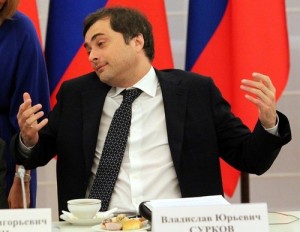
Charles Kurzman, “Rightwing Postmodernists,” November 30, 2014. Iranian hardliners are not the only right-wingers to draw on postmodernism; Vladislav Surkov of Russia also cites postmodern critiques of grand narratives, then segues seamlessly to his preferred grand narrative of embattled Russian nationalism. A similar move lies at the heart of American Christian creationism. This is a sophisticated gesture, demonstrating familiarity with the latest trends in academia. But it is also oddly naive — these conservatives seem not to recognize that the shrapnel of postmodernism flies in all directions, puncturing conservative worldviews just as sharply as scientific discourses. More…
Teaching Middle East Crises
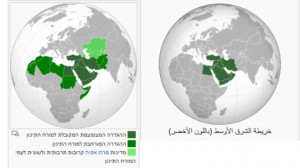 Charles Kurzman, “Teaching Middle East Crises,” October 31, 2014. Those of us who teach international subjects may wonder whether and how to address the latest Middle East crises in our courses. These events are unavoidable in the news, and many of our students have strong feelings about them. How can we navigate the emotional and political difficulties associated with these crises and tie current events to broader themes that run throughout our courses? More…
Charles Kurzman, “Teaching Middle East Crises,” October 31, 2014. Those of us who teach international subjects may wonder whether and how to address the latest Middle East crises in our courses. These events are unavoidable in the news, and many of our students have strong feelings about them. How can we navigate the emotional and political difficulties associated with these crises and tie current events to broader themes that run throughout our courses? More…
Introducing Powerblindness
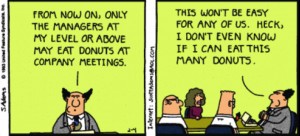
Charles Kurzman, “Introducing Powerblindness,” September 30, 2014. “One of the privileges of privilege is obliviousness. We’ve all known people who were born on third base and think they hit a triple – people who ignore or deny the power that they wield, even as they enjoy the benefits. That’s powerblindness. In a recent paper in the journal Sociology Compass, Rajesh Ghoshal, Kristin Gibson, Clinton Key, Micah Roos, Amber Wells, and I explore this concept and its ramifications. Power and knowledge do not necessarily go together – sometimes the powerful may be unaware of facts of life that the powerless are unable to avoid.” More…
World Values Lost in Translation
 Charles Kurzman, “World Values Lost in Translation,” The Washington Post’s Monkey Cage blog, September 2, 2014. At the dawn of the 21st century, the Vietnamese were the most authoritarian people in the world, according to the World Values Survey. Ninety-nine percent of respondents said they favored military rule. Just a few years later, however, only a third of the sample in Vietnam supported military rule. What caused such a dramatic shift? Most likely, a new translation. In 2001, the survey in Vietnam translated the English question about “Having the army rule” as “The role of the military.” More…
Charles Kurzman, “World Values Lost in Translation,” The Washington Post’s Monkey Cage blog, September 2, 2014. At the dawn of the 21st century, the Vietnamese were the most authoritarian people in the world, according to the World Values Survey. Ninety-nine percent of respondents said they favored military rule. Just a few years later, however, only a third of the sample in Vietnam supported military rule. What caused such a dramatic shift? Most likely, a new translation. In 2001, the survey in Vietnam translated the English question about “Having the army rule” as “The role of the military.” More…
Failing to Forecast the Israeli-Palestinian Crisis
 Charles Kurzman, “Failing to Forecast the Israeli-Palestinian Crisis,” The Washington Post’s Monkey Cage blog, July 29, 2014. “A month ago, three Israeli teenagers were found murdered near Hebron, presumably by Palestinians. Then a Palestinian teenager was found murdered in Jerusalem, presumably by Israelis. Within days, war had broken out between Hamas and Israel. Was this conflict predictable? In a general sense it can hardly be considered a surprise. But the timing of the conflict, sparked by murder and revenge – how could that be predicted?” More…
Charles Kurzman, “Failing to Forecast the Israeli-Palestinian Crisis,” The Washington Post’s Monkey Cage blog, July 29, 2014. “A month ago, three Israeli teenagers were found murdered near Hebron, presumably by Palestinians. Then a Palestinian teenager was found murdered in Jerusalem, presumably by Israelis. Within days, war had broken out between Hamas and Israel. Was this conflict predictable? In a general sense it can hardly be considered a surprise. But the timing of the conflict, sparked by murder and revenge – how could that be predicted?” More…
When Forecasts Fail
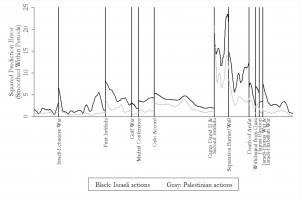
Charles Kurzman and Aseem Hasnain, “When Forecasts Fail: Unpredictability in Israeli-Palestinian Interaction,” Sociological Science, 1:239-259, June 2014. “This article explores the paradox that forecasts may be most likely to fail during dramatic moments of historic change that social scientists are most eager to predict. It distinguishes among four types of shocks that can undermine the predictive power of time series analyses: effect shocks that change the size of the causal effect; input shocks that change the causal variables; duration shocks that change how long a causal effect lasts; and actor shocks that change the number of agents in the system. The significance of these shocks is illustrated in Israeli–Palestinian interactions, one of the contemporary world’s most intensely scrutinized episodes, using vector autogression analyses of more than 15,000 Reuters news stories over the past three decades. The intervention of these shocks raises the prospect that some historic episodes may be unpredictable, even retrospectively.” More… (Replication dataset is available here.)
President Oligarch
 Charles Kurzman, “President Oligarch,” May 31, 2014. This month the wealthiest industrialist in a mid-sized country decided he was sick of the political protests that had brought business to a halt. He ordered his factory managers to organize thousands of workers into battalions to intimidate protesters and drive them from the streets.
Charles Kurzman, “President Oligarch,” May 31, 2014. This month the wealthiest industrialist in a mid-sized country decided he was sick of the political protests that had brought business to a halt. He ordered his factory managers to organize thousands of workers into battalions to intimidate protesters and drive them from the streets.
Welcome to eastern Ukraine, testing ground not just for geopolitics – Russia vs. the European Union and the United States – but also for oligarch politics, where the wealthiest capitalists no longer trust the state to protect their interests and have stepped in to run things themselves. More…
Homegrown Terrorism Threat Was Overhyped
 David Schanzer and Charles Kurzman, “Homegrown Terrorism Threat Was Overhyped,” Newark Star-Ledger, April 14, 2014. In the aftermath of the Boston Marathon bombing one year ago, many commentators and public officials called this tragedy a harbinger of more homegrown terrorist attacks to come. Fortunately, no one has been killed by homegrown terrorists in the past year and there have been no copycat attacks. A nationwide survey of law enforcement agencies we are conducting in collaboration with the Police Executive Research Forum shows that more than half of the agencies report little or no threat from al Qaeda-inspired extremism. Only 2 percent report the threat as “severe.” More…
David Schanzer and Charles Kurzman, “Homegrown Terrorism Threat Was Overhyped,” Newark Star-Ledger, April 14, 2014. In the aftermath of the Boston Marathon bombing one year ago, many commentators and public officials called this tragedy a harbinger of more homegrown terrorist attacks to come. Fortunately, no one has been killed by homegrown terrorists in the past year and there have been no copycat attacks. A nationwide survey of law enforcement agencies we are conducting in collaboration with the Police Executive Research Forum shows that more than half of the agencies report little or no threat from al Qaeda-inspired extremism. Only 2 percent report the threat as “severe.” More…
The Anointment of Saint Francis Al-Sisi
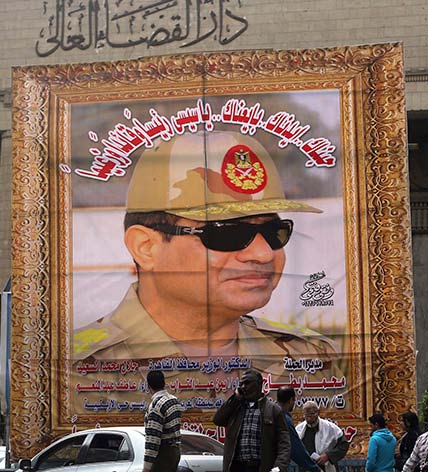 Charles Kurzman, “The Anointment of Saint Francis Al-Sisi,” IslamiCommentary, March 28, 2014. Abdel Fattah al-Sisi, the military ruler of Egypt for the past nine months, is no ordinary candidate for president. He is a saint, or so say some of his supporters. A cleric at al-Azhar seminary likened him to ancient prophets. An eminent civic leader called him Egypt’s “savior from darkness.” Some Egyptians saw his face in a cloud. Ever since al-Sisi deposed President Mohammad Morsi last summer, the Egyptian government has worked to stoke popular adulation for the general. Al-Sisi’s face is featured on billboards outside government buildings, including a giant gilt-framed poster at the Supreme Court that reads: “We love you, we support you, we pledge allegiance to you, O Sisi, as president, as commander, as leader.” Is al-Sisi’s public relations campaign working? More…
Charles Kurzman, “The Anointment of Saint Francis Al-Sisi,” IslamiCommentary, March 28, 2014. Abdel Fattah al-Sisi, the military ruler of Egypt for the past nine months, is no ordinary candidate for president. He is a saint, or so say some of his supporters. A cleric at al-Azhar seminary likened him to ancient prophets. An eminent civic leader called him Egypt’s “savior from darkness.” Some Egyptians saw his face in a cloud. Ever since al-Sisi deposed President Mohammad Morsi last summer, the Egyptian government has worked to stoke popular adulation for the general. Al-Sisi’s face is featured on billboards outside government buildings, including a giant gilt-framed poster at the Supreme Court that reads: “We love you, we support you, we pledge allegiance to you, O Sisi, as president, as commander, as leader.” Is al-Sisi’s public relations campaign working? More…
Anti-Muslim Sentiment Rising in the U.S: What Is Happening to Religious Tolerance?
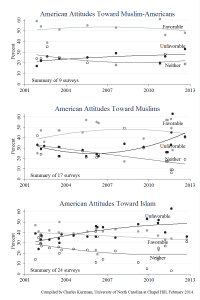 Charles Kurzman, “Anti-Muslim Sentiment Rising in the U.S: What Is Happening to Religious Tolerance?” IslamiCommentary, February 13, 2014. Islamic terrorism has proved to be a relatively small threat to public safety in America since 9/11, yet American attitudes toward Muslim-Americans have grown more negative in recent years. Anti-Muslim attitudes seem to have increased in tandem with an organized campaign to vilify the Muslim-American community as a threat to the United States. Conservatives have been particularly likely to shift toward anti-Islamic views. Even controlling statistically for conservatism, respondents who regularly watched Fox News or listened to conservative talk radio were 50 percent more likely than other respondents to express negative “thermometer” ratings toward Muslims. This trend poses a challenge to America’s self-image as a nation committed to religious freedom. Americans who promote the rights of religious minorities in other countries should be worried about developments in the United States as well. More…
Charles Kurzman, “Anti-Muslim Sentiment Rising in the U.S: What Is Happening to Religious Tolerance?” IslamiCommentary, February 13, 2014. Islamic terrorism has proved to be a relatively small threat to public safety in America since 9/11, yet American attitudes toward Muslim-Americans have grown more negative in recent years. Anti-Muslim attitudes seem to have increased in tandem with an organized campaign to vilify the Muslim-American community as a threat to the United States. Conservatives have been particularly likely to shift toward anti-Islamic views. Even controlling statistically for conservatism, respondents who regularly watched Fox News or listened to conservative talk radio were 50 percent more likely than other respondents to express negative “thermometer” ratings toward Muslims. This trend poses a challenge to America’s self-image as a nation committed to religious freedom. Americans who promote the rights of religious minorities in other countries should be worried about developments in the United States as well. More…
Muslim-American Terrorism in 2013
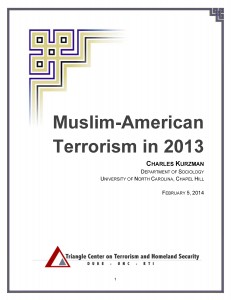 Charles Kurzman, “Muslim-American Terrorism in 2013,” February 5, 2014. Sixteen Muslim-Americans were indicted for or killed during violent terrorist plots in 2013, including the bombing at the Boston Marathon on April 15, which claimed four lives, plus one of the suspects, and injured more than 200 people, including more than a dozen people who suffered amputations. Meanwhile, the United States suffered approximately 14,000 murders in 2013. Since 9/11, Muslim-American terrorism has claimed 37 lives in the United States, out of more than 190,000 murders during this period. The Boston Marathon bombing was one of 30 mass killings in 2013 with four or more fatalities, according to data compiled by USA Today. Mass killings in 2013 led to 137 fatalities, more than three times the victims killed by Muslim-American terrorism in the United States since 9/11. More, including data.
Charles Kurzman, “Muslim-American Terrorism in 2013,” February 5, 2014. Sixteen Muslim-Americans were indicted for or killed during violent terrorist plots in 2013, including the bombing at the Boston Marathon on April 15, which claimed four lives, plus one of the suspects, and injured more than 200 people, including more than a dozen people who suffered amputations. Meanwhile, the United States suffered approximately 14,000 murders in 2013. Since 9/11, Muslim-American terrorism has claimed 37 lives in the United States, out of more than 190,000 murders during this period. The Boston Marathon bombing was one of 30 mass killings in 2013 with four or more fatalities, according to data compiled by USA Today. Mass killings in 2013 led to 137 fatalities, more than three times the victims killed by Muslim-American terrorism in the United States since 9/11. More, including data.